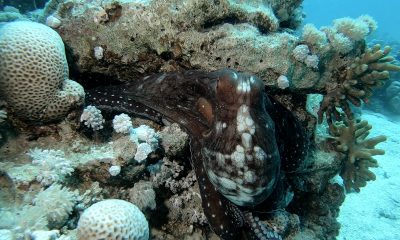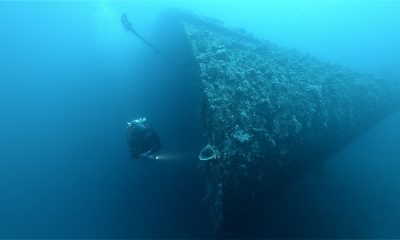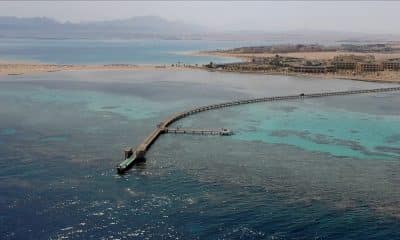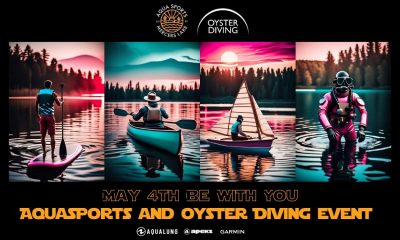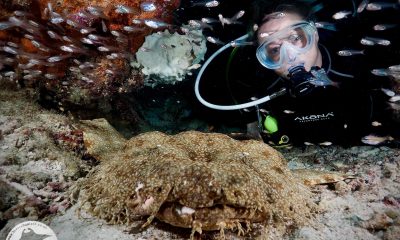Marine Life & Conservation
EXCLUSIVE INTERVIEW: Jeff Goodman talks with Alex Earl – Executive Director, Project AWARE Foundation
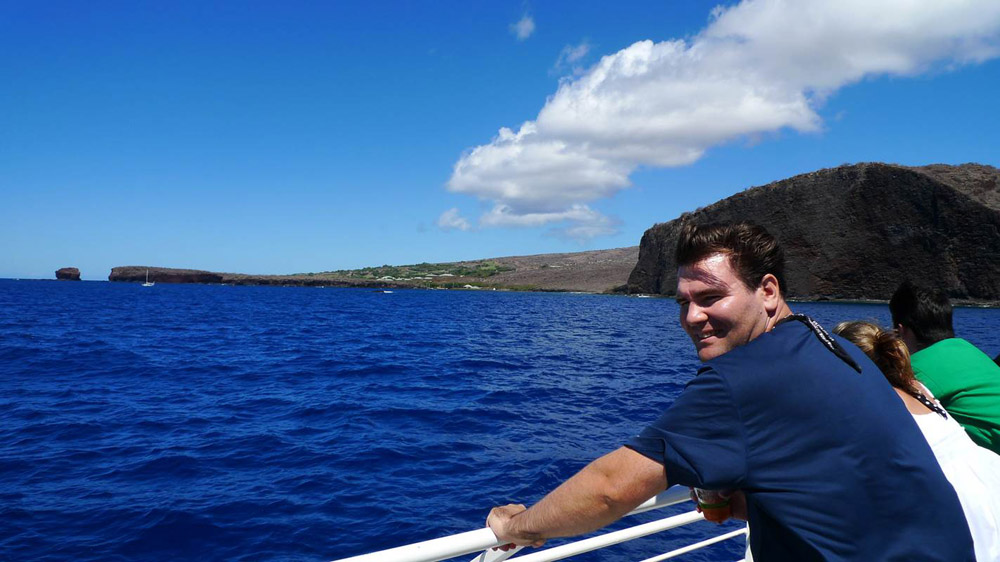
Project AWARE Foundation is a non-profit organization working with scuba divers worldwide to protect the ocean planet one dive at a time. With over 20 years in marine conservation experience and conservation results, Project AWARE is focusing on major ocean issues where scuba divers are uniquely positioned to directly and positively affect real, long-term change – Sharks in Peril, Rays at Risk and Marine Debris, or trash in our oceans. Recently, Project AWARE has achieved major milestones including helping secure historic international protections for some of the world’s most threatened species of sharks and rays. Together, Project AWARE and dive volunteers also removed more than 133,000 lbs/60,000 kgs of trash from 300 underwater sites in one year alone.
Alex Earl’s biography and experience in the world of marine conservation is extensive. If you look him up on Linkedin be prepared for good long read. He is a man who is obviously passionate about our oceans and the protection of all the wildlife they encompass.
I asked Alex how he first became aware and interested in the sea.
Alex: I was fortunate to grow up amidst one of the last wild frontiers on the planet in Stewart, British Columbia, Canada, situated right on the border between Alaska and British Columbia at the end of one of the longest fjords on the Pacific Coast. I spent many days sailing and exploring this coastline with my family and friends. Experiencing this pristine natural setting with wild salmon runs, otters, seals, sharks, porpoises, orcas and whales forged a deep desire to protect and conserve our environment.
Jeff: At what point in your life did you realise our oceans were in serious decline?
Alex: My parents were environmentally aware in the best spirit of the 60s and 70s and encouraged a strong respect for the natural world. They always emphasized that the pristine environment we were experiencing was rare and diminishing globally. My environmental awareness grew as a teenager, in university, volunteering in Central America, and completing outdoor guide training. However, the seminal moment for me in transitioning my awareness to advocacy and activism was completing my PADI Advanced Open Water Diver training in the Philippines in a Marine Protected Area. During the course, I learned about Project AWARE and my instructor, who was from the United Kingdom, was very passionate about marine conservation and diving. He planted the seed which, over time, lead to an epiphany that a professional commitment to marine conservation was my future. I used to lay awake at night staring at the ceiling feeling that I knew the environmental problems faced by the ocean and our planet but that I was not part of the solution. I felt I had to be part of the solution because I had no excuse and did not want to be an old man in the future looking into the eyes of children and young people who asked me why my generation did not do something when there was still time. Future generations are going to judge us harshly and they are going to need to be inspired by the actions of those who came before them as those in the environmental movement now have been by John Muir, Rachel Carson, David Brower, Paul Watson, Jane Goodall and David Suzuki for example.
Jeff: Can you tell us about your first environmental campaign?
Alex: I worked on a rainforest seedling project in Costa Rica. I was also involved in raising awareness about climate change as a high school teacher in Japan. However, my first environmental campaign as an activist and professional environmentalist was with Sea Shepherd Conservation Society working organizationally to support Operation Migaloo in 2007. This campaign was Sea Shepherd’s annual whale defense campaign in Antarctica with 68 crew members at sea for 83 days covering 20,000 miles in the Southern Ocean. During that campaign, 484 whales were saved and no humpback or fin whales were killed. Operation Migaloo was the first Sea Shepherd anti-whaling campaign to be filmed by Animal Planet and it’s profiled in Season 1 of the television series Whale Wars.
Jeff: I see from your profile on the Project AWARE website (projectaware.org) that early in your conservation career you became a global executive for the ‘front line’ Sea Shepherd Conservation Society. Having made a few films with Paul Watson I know how dedicated the crews and supporters of his campaigns are. I personally think direct action is often the only alternative left to us when confronting the impossible odds of bureaucracy, indifference and short term economics. What made you join Sea Shepherd rather than a more conventional conservation group?
Alex: I was very proud and honored to join Sea Shepherd Conservation Society and to work with amazing activists across the globe like Kim McCoy, Chuck Swift, Carla Robinson, Kurt Lieber, Peter Hammarstedt, Alex Cornelissen, Jeff Hansen, and Geert Von Jon because I also share your perfectly stated sentiment that direct action is often the only alternative left when confronting the impossible odds of bureaucracy, indifference and short term economics. By the day, this is becoming more of the case. We are witnessing ecocide take place before our eyes to ecosystems and animals that have been on the planet for hundreds of millions of years and it’s a crime against future generations. Growing up, Sea Shepherd received prominent media attention in my home province of British Columbia. Aside from challenging whaling globally and the seal hunt in Eastern Canada, Sea Shepherd also fought battles over old growth clear cutting and wolf hunts. To me, in terms of directed action, they were profoundly filling that niche in marine conservation. It takes courage and commitment to push the boundaries and rules of society in order to effect change that would likely not otherwise happen.
Jeff: How does Project AWARE differ from other conservation organisations?
Alex: Project AWARE is the only conservation organization exclusively focused on representing the global environmental voice of scuba divers. We offer impactful global solutions that divers and ocean advocates can be part of through citizen science. Through powerful partnerships and alliances like our international membership in the International Union for the Conservation of Nature (IUCN) for example, we ensure the voice of divers is heard where it has not traditionally been on an international policy level. We have a seat at the table to be part of discussions when and where they matter for some of the world’s most threatened species.
To me, Project AWARE represents one of the best investments in marine conservation because we have 20 years of achievements under our belt and a unique long-term corporate partnership with the Professional Association of Diving Instructors (PADI) which provides us with powerful access to thousands of dedicated PADI Professionals and millions of certified scuba divers. Approximately, 1.5 million advocates are directly engaged with Project AWARE to date and we are growing. Our programs and campaigns align with some of the ocean’s top challenges globally, like the Dive Against Debris program which is the largest year-round underwater survey of its kind. Our supporters are directly trained and positioned to help remove marine debris and advocate for litter prevention globally.
Jeff: On the Project AWARE website it says you support an unprecedented global movement of divers acting in their own communities to protect oceans and implement lasting change. Can you tell us how that support manifests itself?
Alex: That support manifests itself in many ways. Project AWARE is tackling ocean protection from two angles – we’re connecting the dots between a top-down and bottom-up approaches to implement change. Top down, through powerful partnerships and alliances of like-minded policy-makers and NGOs, we’re pushing for change at the highest levels of government. And two, in partnership with 1.5 million scuba divers and activists, we’re working at a grassroots level to take action in local communities of the world. Today, the dive community is becoming more and more aware of the power of its voice and its ability to influence change for critical conservation issues. For example shark and ray tourism is estimated to be worth $310,000,000 USD annually. This is an economic power that opens doors to conversations at a policy level like never before. At CITES in Thailand in 2013, this support manifested itself in the largest petition on behalf of sharks and rays (130,000 signatures) which was backed by celebrities like Leonardo Di Caprio and Survivorman Les Stroud.
Jeff: If an individual or group of divers have concerns about the conservation of their local area and wanted to start their own campaign, would Project AWARE be able to look at those concerns and offer help in some way?
Alex: Here at Project AWARE, we do believe that lasting change is people-powered. Our online conservation network, My Ocean (projectaware.org/MyOcean) was specifically designed as a platform for divers and local leaders to scale up environmental issues and actions for change. In My Ocean you can post local events and recruit volunteers, you can post images and updates on local campaigns and connect with like-minded advocates in the dive community My Ocean. So far, this unique community has over 9,000 members globally and any member can request assistance or advice on a peer to peer level. In addition, if a diver or group of divers have regional conservation concerns and want to create a local initiative or campaign they can also apply for funding from our annual Ocean Action Project. Beyond these avenues we always work as we can to provide advice or consultation to the dive community if requested about how they may address local conservation issues or create campaigns.
Jeff: At the moment Project Aware seems to be focusing on two major concerns, Sharks in Peril and Marine Debris. How can people, especially divers, become involved?
Alex: In 2014, Project AWARE is focused on Marine Debris through our Dive Against Debris program, Sharks in Peril, Manta Rays at Risk, the Ocean Action Project, and rolling out the new 10 Tips for Divers to Protect the Ocean Planet. As the only marine conservation organization exclusively focused on the dive community there is always a welcome sign on our door for divers to become engaged together with us. If divers want to work on the marine debris issue we encourage them to become citizen scientists by organizing or taking part in a Dive Against Debris event in their local area or while travelling. The data collected is used in our policy efforts with government and industry to try to stop any more marine debris from entering our marine ecosystems which is the only long-term solution. Project AWARE has global policy coverage on this issue as a founding member of the Trash Free Seas Alliance (USA), a member of the Boomerang Alliance (Australia), and a member of Seas At Risk (Europe). If divers are passionate about sharks and rays and want to help raise awareness and funds for their conservation then we encourage them to organize or take part in a Finathon event. In 2013, over $65,000 USD was raised to support Project AWARE’s shark and ray program efforts. If divers want to organize their own campaigns for sharks and rays or marine debris they can apply to the Ocean Action Project or outline their project on My Ocean. If PADI dive centers and professionals want to support Project AWARE they can join our 100% AWARE program ensuring that every dive student they train will receive a Project AWARE certification card and that our programs will receive regular funding that can be budgeted. We also encourage divers to sign up for our newsletter, to follow updates on our site and social media, and to help spread these updates for maximum awareness.
Jeff: As we become more aware each year of the global decimation of our marine life, do you ever get despondent to the point of not knowing what to do next?
Alex: Many things cross my desk that leave me questioning the state of humanity which could easily drive me to become despondent. It often seems like ignorance, greed, and destruction are exponentially outpacing valiant efforts to offset them. However, I have a three year old son, young nieces, staff and friends with young children so for them and the sake of their generation I don’t have the luxury of going to this place. I have also learned to maintain a balance of a healthy sense of humour and perspective. From an optimistic standpoint I know that I work with a team at Project AWARE that offers inspired and positive solutions. There are also many other marine conservation and environmental organizations doing great work which is inspiring and critical. Each of our efforts collectively are taking a bite out of the problem and they are making a difference. Change is happening but the battle is ensuring that it happens fast enough on a global scale. When I was a child society culturally accepted drinking while driving, not using seat belts while driving, no carseats for small children, and smoking with little to no limits. In a relatively short space of time society has recognized the dangers of these activities and placed limits on them. We have the capability to recognize the errors of our ways as a species and to change course. Now we need do this more quickly and globally or we face unimaginable consequences and the wrath of future generations.
Jeff: We often hear statistics and opinions on sustainability and fish quotas, yet each year I see less and less marine life. We are advised to eat lots of fish and at the same make sure they are sustainably caught. To me, this is simply market forces at work where different species are looked upon as separate entities and not as crucial parts of global food chains. I feel there are few, if any, truly sustainable wild fisheries in existence. We seem to just keep species as close as possible to the boarders of extinction.
What do you truly think will happen to the state of our marine ecosystems in the years to come?
Alex: I am not a marine scientist or biologist, rather I am an activist and professional within the environmental non-profit sector so my opinions expressed here are from this sphere. I think that we are at a tipping point and must take profound and immediate action or face a predictable destiny where it is estimated that there will be virtually nothing left to fish by mid-century, where ocean acidification is rampant and where jelly fish become the predominant ocean species on the planet. The risks of not taking action have been well publicized but the real question is, can or will humanity rise to the occasion to make the change needed in time? I have great faith that this change will happen because I have personally experienced and there is a momentum of energy forward that will only grow stronger. I recall being very surprised and inspired when I worked at Sea Shepherd by the support we received from unlikely marine conservation supporters spread around the world who did not know each other but felt the same way. I have experienced this also at Project AWARE. What this tells me is that there something innate in human beings that want to be connected to nature and to protect it especially when we truly understand what is at risk.
Jeff: I personally find that the majority of people I meet have little or no comprehension of the depleted state of our seas. It’s difficult for the majority to become involved while at the same time struggling to make a living, raise a family and pay the bills. What do you feel is the best way of addressing this?
Alex: I agree Jeff. The majority of people are so busy struggling making a living, raising a family, and paying the bills that they are left with very little time or energy to comprehend the rapid and unprecedented environmental depletion of our planet let alone act on it. These changes also create what is referred to as shifting baselines where we incrementally adjust to depletion in our environment to the point where we forget what real ocean abundance and diversity really is or was. Consequently it may not be apparent to many as to why we must act. It is very challenging to get the public to understand or internalize that our life support systems, including the 71 percent of the planet that the ocean constitutes, are at risk of collapse. I believe that constant and creative education, awareness, and communications, as well as cutting edge programs that enable the public to be part of the solution are key. While it is important to communicate how serious the situation is it is even more important to communicate hope, inspiration, and concrete solutions or paths forward.
Jeff: The sea is my passion and I am just as thrilled to see hermit crabs changing shells as I am to see whales lunging through bait balls. I must confess though, the adrenalin factor is slightly higher with the whales. I’m sure you are asked this quite a lot, but do you have favourite places to dive or species to see?
Alex: The sea is also my passion from its soul renewing beauty to watching the antics of the smallest to the largest marine animals. I am also a big fan of whales but my favorite species to see underwater are sharks, rays and giant pacific octopus. Some of my favourite places to dive are British Columbia, Canada; the Philippines; the Great Barrier Reef, Australia and Cozumel, Mexico.
Jeff: Could you sum up for us why it is so important to preserve our oceans and tell us how to best support their conservation in our daily lives?
Alex: The ocean regulates our climate, holds 97 percent of Earth’s water, and supports the greatest abundance and diversity of life on our planet. Earth truly is an ocean planet. More has been invested in learning about other planets than our ocean. From a purely selfish point of view, it is important to preserve the ocean because the fate of humanity is tied to the fate of the ocean and marine animals. I believe if we don’t get this right and survive as a species then in the minimum we will permanently lose a deep spiritual, emotional, and creative part of ourselves that is tied to a healthy and abundant ocean. Esteemed Oceanographer and Project AWARE Advisory Board Member, Sylvia Earle, calls the ocean the blue heart of our planet and profoundly states that “our actions over the next 10 years will determine the state of the ocean for the next 10,000 years.” The time to act is now.
In terms of supporting conservation in one’s daily life, I think the starting point is to find an environmental non-profit with a mission and programs that speak to you and that you are passionate about. The Project AWARE team works hard to represent this to divers and ocean advocates. I would check third party charity evaluators and annual reports posted on non-profit sites to ensure that funds that are donated are used efficiently and for impact. Once you have found the right non-profit fit then sign up for any communications like newsletters and social media to stay on top the latest developments and volunteering options. Spread awareness with your family and friends. Don’t underestimate how important it is to invest in ocean protection. Marine conservation receives an extremely small amount of the funds that are given to the environmental movement. Public donations of any size are extremely important and make a difference. Individuals should not underestimate the power they have in their daily actions as well and should not assume that if they don’t act then all will be good because someone else will. We are all on duty protecting our ocean planet.
Jeff: Thanks Alex.
[youtube id=”vfHFm-wj2qo” width=”100%” height=”400px”]
To find out more about Alex, click here.
To find out more about Project AWARE, click here.
Marine Life & Conservation
Leading UK-based shark conservation charity, the Shark Trust, is delighted to announce tour operator Diverse Travel as a Corporate Patron

 Corporate Patrons provide a valuable boost to the work of The Shark Trust. The Trust team works globally to safeguard the future of sharks, and their close cousins, the skates and rays, engaging with a global network of scientists, policymakers, conservation professionals, businesses and supporters to further shark conservation.
Corporate Patrons provide a valuable boost to the work of The Shark Trust. The Trust team works globally to safeguard the future of sharks, and their close cousins, the skates and rays, engaging with a global network of scientists, policymakers, conservation professionals, businesses and supporters to further shark conservation.
Specialist tour operator Diverse Travel has operated since 2014 and is committed to offering its guests high quality, sustainable scuba diving holidays worldwide. Working together with the Shark Trust will enable both organisations to widen engagement and encourage divers and snorkellers to actively get involved in shark conservation.
“Sharks are truly at the heart of every diver and at Diverse Travel, we absolutely share that passion. There is nothing like seeing a shark in the wild – it’s a moment that stays with you forever!” says Holly Bredin, Sales & Marketing Manager, Diverse Travel.
“We’re delighted to celebrate our 10th year of business by becoming a Corporate Patron of the Shark Trust. This is an exciting partnership for Diverse and our guests. We will be donating on behalf of every person who books a holiday with us to contribute towards their vital shark conservation initiatives around the world. We will also be working together with the Trust to inspire divers, snorkellers and other travellers to take an active role – at home and abroad – in citizen science projects and other activities.”
Paul Cox, CEO of The Shark Trust, said:
“It’s an exciting partnership and we’re thrilled to be working with Diverse Travel to enable more divers and travellers to get involved with sharks and shark conservation. Sharks face considerable conservation challenges but, through collaboration and collective action, we can secure a brighter future for sharks and their ocean home. This new partnership takes us one more valuable step towards that goal.”
For more information about the Shark Trust visit their website here.
For more about Diverse Travel click here.
Marine Life & Conservation
Shark Trust Asks Divers to help with Shark Sightings this Global Citizen Science Month

 Whether you are stuck for ideas of what to do with the kids or are off on the dive trip of your dreams. You can get involved in Citizen Science Month and help the Shark Trust by providing vital data about sharks are rays both close to home and further afield.
Whether you are stuck for ideas of what to do with the kids or are off on the dive trip of your dreams. You can get involved in Citizen Science Month and help the Shark Trust by providing vital data about sharks are rays both close to home and further afield.
In addition to reporting the sharks and rays you see on your dives, the eggcases you find on the beach, the Shark Trust is looking for some specific data from divers who are asked to report any Oceanic Whitetip and Basking Sharks.
Oceanic Whitetip Sharks
The Shark Trust are looking specifically for Oceanic Whitetip Shark sightings over the coming weeks and months. So, if you are diving anywhere in the world, please report your sightings via the website or app.
Website: https://recording.sharktrust.org/
App: Search The Shark Trust in your app store
The Oceanic Whitetip. Known for their incredibly long dorsal and pectoral fins, this species was once the most abundant oceanic-pelagic species of shark on the planet.
Large and stocky, they are grey or brown above, and white below and famous for their huge rounded first dorsal fin and paddle-like pectoral fins. The fins also highly prized within the shark fin trade. Whilst they are mostly solitary, Oceanic Whitetips do occasionally hunt in groups.
An inquisitive species, they were easy prey for fisheries. Combined with their low reproductive rate, they were inevitably at high risk of population depletion. And declines of up to 99% have been reported in certain sea areas. They are listed as Critically Endangered on the IUCN Redlist (2019).
Conservation efforts to discourage further declines include listing on CITES Appendix II and CMS Appendix I. They’re also the only species prohibited from take by all the Tuna RFMOs (Regional Fisheries Management Organisations). However, these measures do not mean that Oceanic Whitetips are not still caught – whether targeted or as bycatch – in some parts of the world. With populations declining at such a high rate, effective implementation of management measures is essential to ensure that the species can recover.
If you are lucky enough to get an image of an Oceanic Whitetip and you record your sighting on the Shark Trust app or website YOU CAN WIN! All images submitted with sightings, that also give consent to use in conservation messaging, will be in with a chance to win an Oceanic Whitetip T-shirt and mug. The competition will run until the end of “Shark Month” in July – so keep those sightings (and images) coming in.
Basking Sharks
Basking Shark (Cetorhinus maximus) season is upon us, and the Shark Trust is asking everyone to keep an eye out for these majestic giants over the summer months. If you see any, you can record your sighting to the Basking Shark Sightings database.
Each year, these mighty fish return to British waters to feed on plankton. You may see one, (or a few if you’re really lucky) from around April-October. They can be seen feeding at the surface of the water, where they look like they’re basking in the sun. Thus, their name!
Sighting hotspots around the British Isles include southwest England, Isle of Man, north coast of Ireland, and western Scotland. The Sea of the Hebrides is the most prolific sightings area in Scotland, but they have been spotted all around the coast and have even ventured into some of the sea lochs. The Shark Trust has received thousands of sightings since the Basking Shark project began, but more data is needed to truly understand what is going on with population numbers and distribution. You can help by recording your sightings this summer.
Great Eggcase Hunt
The Shark Trust has an Easter Egg Hunt with a difference for you to try. Take part in the Great Eggcase Hunt and get involved with a big citizen science project that helps shark, ray and skate conservation. And it’s an enjoyable activity for all the family.
The Shark Trust also want snorkellers and divers to record their underwater eggcase findings. Underwater records help pinpoint exactly where sharks and skates are laying their eggs and can help link to beach records. Learning the depth and substrate that they lay on also helps better understand the species.
Find out more: https://www.sharktrust.org/great-eggcase-hunt
Whether you are diving, snorkelling or exploring on the beach you can take part in Citizen Science Month and get actively involved in shark and ray conservation. Find out more: www.sharktrust.org
-

 News3 months ago
News3 months agoHone your underwater photography skills with Alphamarine Photography at Red Sea Diving Safari in March
-

 News2 months ago
News2 months agoCapturing Critters in Lembeh Underwater Photography Workshop 2024: Event Roundup
-

 Marine Life & Conservation Blogs2 months ago
Marine Life & Conservation Blogs2 months agoCreature Feature: Swell Sharks
-

 Blogs1 month ago
Blogs1 month agoMurex Resorts: Passport to Paradise!
-

 Gear News3 months ago
Gear News3 months agoBare X-Mission Drysuit: Ideal for Both Technical and Recreational Divers
-

 Blogs2 months ago
Blogs2 months agoDiver Discovering Whale Skeletons Beneath Ice Judged World’s Best Underwater Photograph
-

 Gear Reviews2 months ago
Gear Reviews2 months agoGear Review: Oceanic+ Dive Housing for iPhone
-
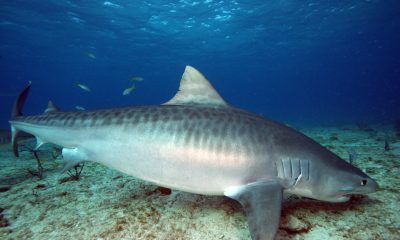
 Blogs3 months ago
Blogs3 months agoThe Thrilling Encounter with Tiger Sharks at Beqa Lagoon’s ‘The Colosseum’ with Coral Coast Divers



